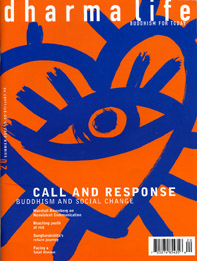'What are you waiting for?'
Kindly, compassionate, playful Zenshin Philip Whalen is dead. Born in Portland, Oregon, in October 1923, Whalen was ordained a Zen monk in 1973, having spent most of the 1960s living in Japan. He received Dharma transmission from his teacher, Richard Baker, in July 1987, and was for many years abbot and resident teacher at the Hertford Street Zen Center in San Francisco.
Whalen was also a key figure in the San Francisco renaissance, which transformed US poetry during the 1950s and '60s, and an important member of the Beat Generation. He arrived in San Francisco during the summer of 1951, and soon met Allen Ginsberg and Jack Kerouac (who later fictionalised Whalen as characters in two of his novels: Ben Fagan in Big Sur and Warren Coughlin in The Dharma Bums). Whalen was among the five poets at a famed reading in October 1955, when Ginsberg read 'Howl' for the first time: 'I saw the best minds of my generation destroyed by madness ...' With these friends Whalen set aside efforts at formal verse, inspired by T.S. Eliot and other modernists, to take up what Kerouac called 'a kind of new-old Zen Lunacy poetry, writing whatever enters into your head as it comes, poetry returned to its origins, in the bardic child, truly ORAL ... instead of gray-faced academic quibbling'.
In a 1959 text, Whalen described his poetry as 'a picture or graph of a mind moving' (Since you ask me). This evokes the energy and indirection of his poems, which sometimes are shot through with sudden shifts of tone, voice and subject, like most people's thinking. Many of his poems are conversational or dialogic, which has the effect of decentring them – the 'I' is spread within the poem, not identified with a central, authoritative voice – so the reader is uncertain who is speaking, who's addressed, and the weighty expectation of a consistent voice (which we demand more readily of literature than of our own minds) is set aside:
Have a jellybean ...
Here comes a tiger.
(The Slop Barrel)
Whalen's work is playful and simple, clamorous with multiple voices and references (mythological, Classical, Buddhist and more broadly religious), but it is also basically serious, and later tended to serenity.
The real thing is always an imitation
Consider new plum blossoms behind the zendo
(Dharmakaya)
Writing after Whalen's death, Gary Snyder described his friend's poetry as 'a main part of his teaching.' Compassion was another strong emphasis, which he expressed in his Dharma talks as in his poetry. 'At the bottom of the whole shebang is Buddha's compassion – to save all beings. A passionate drive to end the suffering of stars, fish, people and everything.' In a poem praising his Zen forebears he describes them as 'Happy to have saved us all' (Hymnus ad Patrem Sinensis). In another, entitled A Vision of the Bodhisattvas, he imagines a train of Bodhisattvas passing by 'one by one riding on animals / What are you waiting for, they want to know'.
What am I waiting for?
A change in custom that will take 1000 years to come about?
Who's to make the change but me?
This realisation, that we're biding time so long as we're not actually 'making the change' involved in cultivating the Buddha's 'passionate drive to end the suffering of stars, fish, people and everything' refracts through many of Whalen's poems. 'We seldom treat ourselves right,' he notes in one written in the mid-1960s (Tara). Later, in a poem written in Kyoto, he remarked: 'We don't treat each other any better. When will I / Stop writing it down' (Walking beside the Kamogawa). It is not enough, Whalen observes, just to wait, simply to write about the need to treat ourselves and one another better – we must actually work on changing ourselves.
If nothing else we must submit ourselves
To the charitable impulses of our friends
Give them a crack at being bodhisattvas
(On Which I Renounce the Notion of Social Responsibility)
In 1987 Whalen was struck with a degenerative eye condition that eventually rendered him unable to read or write. His friends took turns to read aloud to him, and he continued to meet for a weekly sushi meal with Beat poets Michael McClure and Diane DiPrima.
A week or so before he died Whalen apparently said he felt the atmosphere around him was unduly heavy, that his friends were treating the subject of his death too morbidly. To counter this seriousness, he's said to have asked to be laid out at his funeral on a bed of frozen raspberries.
Manjusura writes about poetry and the arts for journals in the UK and US



